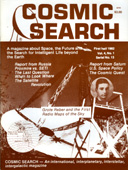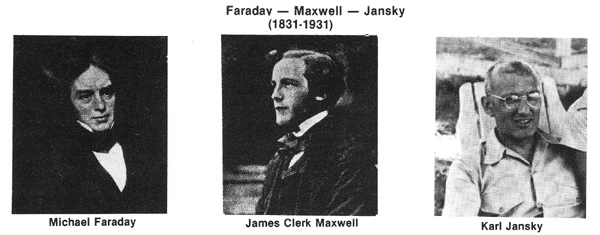![[NAAPO Logo]](../../Images/NAAPOsm.jpg) North American AstroPhysical Observatory (NAAPO)
|
|
Faraday - Maxwell - Jansky
(1831-1931) By: John Kraus
In 1831 Michael Faraday, in London, discovered that plunging a bar magnet into a coil of wire produced an electric current. This discovery complemented the one by Hans Christian Oersted twelve years earlier in Denmark that a compass needle was deflected by a current-carrying wire. Thus, Oersted found that electricity produced magnetism while Faraday found that magnetism could produce electricity. These discoveries were the stepping stones by which James Clerk Maxwell, born in 1831, later propounded his laws relating electricity and magnetism. And from these basic beginnings have come our whole modern world of electric light, heat, power, refrigeration, motors, generators,
telephone, telegraph, radio, TV and a host of other developments we now take for granted.
One of these more recent developments is radio astronomy stemming from the discovery by Karl Jansky in 1931 of radio waves from our galaxy. The Fall 1981 issue of COSMIC SEARCH (Serial No. 12) commemorated the 50th anniversary of Karl Jansky's discovery. It could equally well commemorate the
150th anniversary of Faraday's discovery and Maxwell's birth.
By 2031, 200 years after the Faraday-Maxwell date and 100 years after Jansky's, will there have been
any new discoveries that will match theirs?
|

